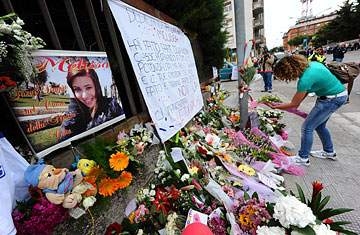
Flowers, dolls and messages are being left by mourners in front of the school 'Francesca Morvillo Falcone', where the explosion on 19 May killed Melissa Bassi, in Brindisi, Italy, 20 May 2012
The image, in the familiar gray grains of a surveillance tape, shows a man in a black jacket reaching into his pocket. If investigators are right, it captures him in the exact moment he set off a massive explosion that killed a 16-year-old girl and injured 10 of her classmates as they were entering their school Saturday morning. But while the footage, from a video camera near the site of the bombing in the southern Italian town of Brindisi, seems to have put prosecutors closer to discovering who was behind the assault, it doesn't appear to have provided any clues as to why he did so.
The earliest signs seemed to point to the mob. The school where the explosion took place was named after the wife of an anti-mafia prosecutor who had been murdered along with her husband when their car passed over a half-ton bomb. That incident took place almost 20 years to the day of the school bombing. Meanwhile, the region nearby had just been the target of a crackdown on organized crime. And an anti-mafia march was expected to pass through Brindisi the next day. There are "too many coincidence in this affairs," said Mayor Mimmo Consales.
But that thesis was quick to unravel. Local prosecutors poured cold water on it, pointing out that the local mafia — the United Sacred Crown — had been trying to build popular support in the region. "If the mafia does something like this, it means they want to sent a message," says Lirio Abbate, an Italian journalist and the author of The Mafia I Knew. "They leave a sort of signature to say why they did it." The explosives — a crude detonator attached to three gas canisters and hidden in a dumpster outside the gate — were less sophisticated than what the mob usually uses. By the next day, the heads of the local clans in prison had been quoted in the newspapers, lending their voices to the denial: "We've got nothing to do with this horror."
Times are bad in Italy. Austerity cuts ever deeper; anarchists have claimed credit for a series of postal bombs sent to the country's tax collection agency as well as for the shooting and wounding the head of a nuclear engineering company. And if that wasn't enough, a 6.0 magnitude earthquake ravaged a swathe of northern Italy on Sunday. But the death and maiming of innocents in Brindisi depressed a nation already down in the dumps.
Brindisi investigators say evidence points to "an isolated act," perhaps by a lone suspect, a white man aged between 50 and 55, wearing a dark jacket, light pants and gym shoes on the day of the attack. The video images are too blurred to make out his face. But the authorities stress that they can't completely exclude anything — neither a terrorist attack by an organized group, nor even, completely, the mafia.
Public response to the bombing has been emotional, with hundreds demonstrating as far away as Rome and Torino. "I spoke in a piazza packed with people," says Nichi Vendola, the governor of the region of Apulia, who attended a demonstration in Mesagne, where the students were from. "The statements that received the most applause were those that said we can't kneel, that the important thing is to keep the schools open, that schools are the enemy of violence and death."
On Sunday, Pope Benedict XVI condemned the violence as "despicable," and called on the faithful to pray for the dead and wounded. A series of high government officials — including perhaps Prime Minister Mario Monti, are expected to attend the funeral of Melissa Bassi, the girl killed in the attack, on Monday evening. "I saw the mother and father of Melissa today," says Vendola. "The mother said, with a thread of voice, 'Find him. So Melissa can rest in peace.' I've seen suffering many times. But to see it so strong, so irreparable. I swear, seeing that woman, I saw Michelangelo's Pieta. It left me in shock. And it convinced that these things should never happen again."
